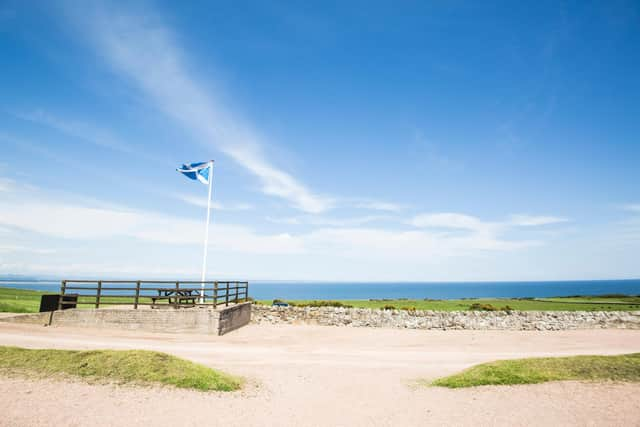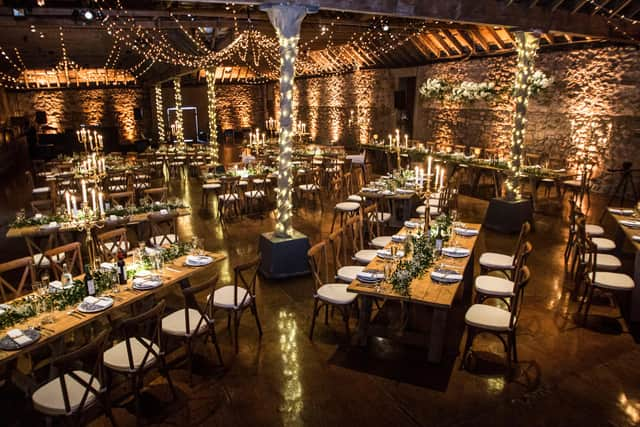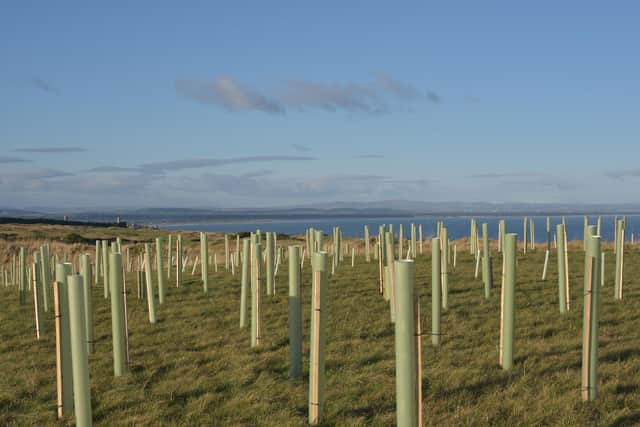Rewilding: Luxury wedding venue vows to bring back nature on Scotland’s east coast
Around 100 acres of former farmland will be returned to nature as part of the scheme at Kinkell Byre, an exclusive events venue based in a converted barn overlooking the sea near St Andrews.
Work has already got under way after the venue was awarded £27,150 from the Scottish Government’s Nature Restoration Fund.
Advertisement
Hide AdAdvertisement
Hide AdThe grant will enable the creation of a large, connected network of rewilded land to the south-east of St Andrews, where the former arable and livestock farm is located.


Trees and hedgerows will be planted and wetland created on the site, which includes 70 acres of grass fields and 30 acres of cliffs.
Rewilding the land at Kinkell will allow natural processes to take hold once again and will reverse the loss of biodiversity caused by years of intensive farming.
The work will encourage the return of native plants, insects, bees, birds, and larger animals.
Increased diversity of the plantlife will also capture more carbon from the atmosphere, helping combat climate change.


As well as environmental benefits, the project is expected to create new job opportunities in the area.
Rory Fyfe, project manager at Kinkell Byre, said: “By Rewilding Kinkell we hope to bring back lost wildlife, enriching our environment and providing multiple ecological benefits.
“In addition, helping to create a richer ecology near St Andrews will broaden local opportunities for educational and community engagement with nature and will create green jobs.”
Advertisement
Hide AdAdvertisement
Hide AdRewilding is defined as the large-scale restoration of ecosystems to the point where nature is able to take care of itself.


Projects seek to reinstate natural processes and where appropriate bring back missing species, allowing them to shape the landscape and the habitats within.
The aim is to encourage a balance between people and nature, allowing both to thrive.
Rewilding can provide opportunities for communities to diversify and create nature-based economies; for living systems to provide the ecological functions on which we all depend; and for people to reconnect with the outside world.
The concept has grown in popularity in recent years, with a number of high-profile schemes taking place across Scotland.
These include the biggest of its kind in the UK – an ambitious 30-year plan that will see up to half a million acres of land in the Highlands brought back to a healthy natural state.
The Scottish Government’s Nature Restoration Fund supports a range of urban, rural, marine, and coastal projects to address the twin crises of biodiversity loss and climate change.
It specifically encourages applicants with projects that will increase the biodiversity and environmental value of land and sea, with a focus on habitats and species and supporting green skills, training, and jobs where possible.
Advertisement
Hide AdAdvertisement
Hide AdSuccessful projects will contribute to national goals for a green recovery from Covid-19 and a nature-rich future for Scotland.
Rewilding Kinkell is one of 54 successful projects across the country to benefit from an additional £5 million of support committed in the latest round of the Nature Restoration Fund.
The projects aim to take practical steps to improve natural habitats, safeguard plant and animal species and improve biodiversity.
The 2021 Nature Restoration Fund adds to Scottish Government funding delivered through the Biodiversity Challenge Fund, Scottish Rural Development Programme and other sources to support biodiversity and help to deliver Scotland’s Biodiversity Strategy.
Biodiversity minister and Scottish Greens MSP Lorna Slater said: “Too much of Scotland’s natural environment is degraded after years of over-exploitation, but this government is committed to restoring nature and our wildlife.
“The Nature Restoration Fund will play a big role in delivering these aspirations, and the projects we are funding today are just the beginning.
“The Fund kick-starts a new approach, supporting longer-term, larger, landscape-scale projects across Scotland – on land and at sea – that address the twin crises of biodiversity loss and climate change.
“Over this parliament we will invest at least £65 million through the fund, delivering real change that people and nature will benefit from across the whole country.”
Advertisement
Hide AdAdvertisement
Hide AdFrancesca Osowska, chief executive of national agency NatureScot, said the United Nations climate summit COP26, held in Glasgow last November, had driven home the urgency of the environmental crisis.
“But there is hope,” she said.
“By restoring nature, protecting, and enhancing habitats and safeguarding marine life we can look forward to a nature-positive future.
“Scotland is taking action now to meet the huge challenges and pressures that nature is facing and it is projects like these that will make the difference and set us on the road to recovery.
“Climate change needs nature-based solutions, not only to help us reach net zero by 2045 but to create a healthier, more resilient Scotland.”
Natural processes include: seasonal change; the cycle of life and death for plants and animals; weather; and geological processes such as erosion, deposition and earthquakes.
They can also be driven by animal behaviour such as grazing, seasonal migrations, reactions to weather or responses to predators.
But many of these processes have been interrupted, damaged or broken by human activities – through the damming, straightening, widening and deepening of rivers and waterways, burning of peatlands, draining of wetlands, extermination of predators such as wolf and lynx, killing and conserving of particular plants and animals, introduction of non-native species, deforestation, replacement of broadleaf woodland with coniferous plantations and other moves.
Rewilding is about working with nature to get the foundations of life working again.
Advertisement
Hide AdAdvertisement
Hide AdA key principle is the belief that nature may not need intervention and can lead its own recovery if missing and damaged natural processes are restored or replaced.
A message from the Editor:
Thank you for reading this article. We’re more reliant on your support than ever as the shift in consumer habits brought about by coronavirus impacts our advertisers.
If you haven’t already, please consider supporting our trusted, fact-checked journalism by taking out a digital subscription.
Comments
Want to join the conversation? Please or to comment on this article.
